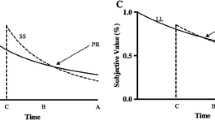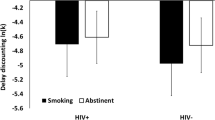Abstract
To determine whether reduction of smoking via contingency management in depen-dent smokers would decrease the discounting of delayed reinforcers compared with smokers who did not reduce their smoking, moderate to heavy cigarette smokers were randomly assigned to one of two conditions: a contingency management condi-tion and a control condition. In three phases (baseline discounting determination for hypothetical money and cigarettes, implementation of a contingency management or control condition, and postintervention discounting determination), the procedure to reinforce reduction in cigarette smoking produced CO decreases in all subjects exposed to that procedure. Discounting decreased significantly for both cigarettes and money among the group for whom smoking reductions were reinforced, whereas the control group showed no significant change for either commodity. Reductions in smoking can lead to reductions in discounting, and increased discounting in current smokers may be a reversible effect of nicotine dependence.
Similar content being viewed by others
References
ALLEN, T. J., MOELLER, G., RHOADES, H. M., & CHEREK, D. R. (1998). Impulsivity and history of drug dependence. Drug and Alcohol Dependence, 50, 137–145.
BAKER, F., JOHNSON, M. W., & BICKEL, W. K. (2003). Delay discounting in. Cupurrent and never-before cigarette smokers: Similarities and differences across commodity, sign, and magnitude. Journal of Abnormal Psychology, 112, 382–392.
BICKEL, W. K., & MARSCH, L. A. (2001). Towards a behavioral economic understanding of drug dependence: Delay discounting processes. Addiction, 96, 73–86.
BICKEL, W. K., ODUM, A. L., & MADDEN, G. L. (1999). Impulsivity and. Cigarette smoking: Delay discounting in current, never, and ex-smokers. Psychopharmacology, 146, 447–454.
BRETTEVILLE-JENSEN, A. L. (1999). Addiction and discounting. Journal of Health and Economics, 18, 393–407.
DRAPER, N. R., & SMITH, H. (1981). Applied regression analysis (2nd ed.; pp.108–116). New York: Wiley.
FAGERSTRÖM, K. O., & SCHNEIDER, N. G. (1989). Measuring nicotine dependence: A review of the Fagerström tolerance Questionnaire. Journal of Behavioral Medicine, 12, 159–182.
FERSTER, C. B., & SKINNER, B. F. (1957). Schedules of reinforcement. New York: Appleton-Century-Crofts.
GIORDANO, L. A., BICKEL, W. K., LOEWENSTEIN, G., JACOBS, E. A., MARSCH, L., & BADGER, G. J. (2002). Mild opioid deprivation increases the degree that opioid-dependent outpatients discount delayed heroin and money. Psychopharmacology, 163, 174–182.
GREEN, L., MYERSON, J., LICHTMAN, D., ROSEN, S., & FRY, A. (1996). Temporal discounting in choice between delayed rewards: the role of age and income. Psychology of Aging, 11, 79-84.
JARVIS, M. J., TUNSTALL-PEDOE, H., FEYERABEND, C., VESEY, C., & SALOOJEE, Y. (1987). Comparison of tests used to distinguish smokers from nonsmokers. American Journal of Public Health, 77, 1435–1438.
JAVORS, M. A., HATCH, J. P., & LAMB, R. J. (2005). Cut-off levels for breath carbon monoxide as a marker for cigarette smoking. Addiction, 100, 159–167.
JOHNSON, M. W., BICKEL, W. K., & BAKER, F. (2007). Moderate drug use and delay discounting: a comparison of heavy, light, and never smokers. Experimental and Clinical Psychopharmacology, 15, 187–194.
JOHNSON, M. W., & BICKEL, W. K. (2002). Within-subject comparison of real and hypothetical money rewards in delay discounting. Journal of the Experimental Analysis of Behavior, 77, 129–146.
KIRBY, K. N., & PETRY, N. M. (2004). Heroin and cocaine abusers have higher discount rates for delayed rewards than alcoholics or non-drug-using controls. Addiction, 99, 461–471.
LAGORIO, C. H., & MADDEN, G. J. (2005). Delay discounting of real and. Hypothetical rewards III: Steady-state assessments, forced-choice trials, and all real rewards. Behavioural Processes, 69, 173–187.
LOGUE, A. W. (1988). Research on self-control: An integrating framework. Behavioural and Brain Sciences, 11, 665–709.
MADDEN, G. J., PETRY, N. M., BADGER, G. J., & BICKEL, W. K. (1997). Impulsive and self-control choices in opioid-dependent patients and non-drug-using control participants: Drug and monetary rewards. Experimental and Clinical Psychopharmacology, 5, 256–62.
MADDEN, G. J., BEGOTKA, A. M., RAIFF, B. R., & KASTERN, L. L. (2003). Delay discounting of real and hypothetical rewards. Experimental and Clinical Psychopharmacology, 11, 139–145.
MADDEN, G. J., RAIFF, B. R., LAGORIO, C. H., BEGOTKA, A. M., MUELLER, A. M., HEHLI, D. J, & Wegener, A. A. (2004). Delay discounting of potentially real and hypothetical rewards: II. Between- and within-subject comparisons. Experimental and Clinical Psychopharmacology, 12, 251–261.
MAZUR, J. (1987). An adjusting procedure for studying delayed. Reinforcement. In M. Commons, J. Mazur, J. Nevin, & H. Rachlin (Eds.), The effect of delay and of intervening events on reinforcement value (pp. 55–73). Hillsdale, NJ: Erlbaum.
MITCHELL, S. H. (1999). Measures of impulsivity in cigarette smokers and non-smokers. Psychopharmacology, 146, 455–464.
MITCHELL, S. H. (2004). Effects of short-term nicotine deprivation on. Decision-making: Delay, uncertainty, and effort discounting. Nicotine & Tobacco Research, 6, 819–828.
MORABIA, A., BERNSTEIN, M. S., CURTIN, F., & BERODE, M. (2001). Validation of self-reported smoking status in simultaneous measurement of carbon monoxide and salivary thiocyanate. Preventive Medicine, 32, 82–88.
ODUM, A. L., MADDEN, G. J., & BICKEL, W. K. (2002). Discounting of delayed health gains and losses by current, never and ex-smokers of cigarettes. Nicotine & Tobacco Research, 4, 295–303.
ODUM, A. L., & RAINAUD, C. P. (2003). Discounting of delayed hypothetical money, alcohol, and food. Behavioural Processes, 64, 305–313.
PETRY, N. M. (2001). Delay discounting of money and alcohol in actively using alcoholics, currently abstinent alcoholics, and controls. Psychopharmacology, 154, 243–250.
RACHLIN, H., RAINERI, A., & CROSS, D. (1991). Subjective probability and delay. Journal of the Experimental Analysis of Behavior, 55, 233–244.
RICHARDS, J. B., ZHANG, L., MITCHELL, S. H., & DE WIT, H. (1999). Delay or probability discounting in a model of impulsive behavior: effect of alcohol. Journal of the Experimental Analysis of Behavior, 71: 121–143.
ROLL, J. M., & HIGGINS, S. T. (2000). A within-subject comparison of three different schedules of reinforcement of drug abstinence using cigarette smoking as an exemplar. Drug and Alcohol Dependence, 58, 103–109.
Author information
Authors and Affiliations
Corresponding author
Additional information
This work was performed at the University of Vermont in Burlington and was supported by National Institute on Drug Abuse Grants RO1 DA 11692 and T32 DA 07242.
Rights and permissions
About this article
Cite this article
Yi, R., Johnson, M.W., Giordano, L.A. et al. The Effects of Reduced Cigarette Smoking on Discounting Future Rewards: An Initial Evaluation. Psychol Rec 58, 163–174 (2008). https://doi.org/10.1007/BF03395609
Published:
Issue Date:
DOI: https://doi.org/10.1007/BF03395609




